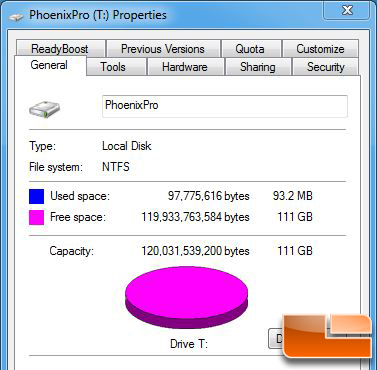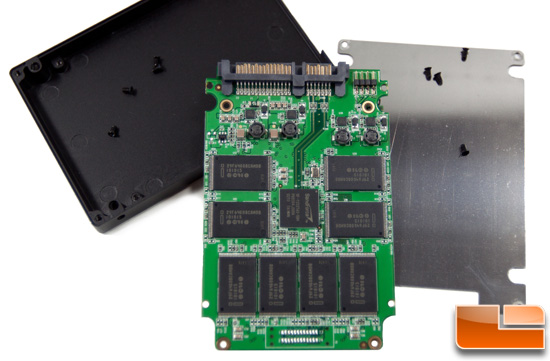G.Skill Phoenix Pro 120GB SandForce SF-1222 SSD Review
Capacity, Final Thoughts & Conclusions
There has been some back and forth on the amount of overprovisioning used to set aside for internal drive maintenance. The early drives used virtually no overprovisioning and then manufacturers started going heavy on this as evidenced by the last generation of drives in which a 100GB drive gave the user roughly 93GB of storage yet had 128GB physically on board. This then loosened up as revised drives were released with a rated capacity of 120GB which translates to around 111GB as reported by Windows 7. This is what we see here on the G.Skill Phoenix Pro.

I can’t say that I am at all surprised by the performance of the Phoenix Pro drive. As mentioned during some of the benchmark assessments, the configuration of the drive is nearly identical to a number of other drives on the market from its competitors. As such, the expectation of its performance to be on par with its peers was there from the start and we weren’t let down. In fact, many of the benchmark numbers were almost exactly what we have seen from the other Sandforce drives in the same configuration. Really, these are all pushing the limits of what the SATA II interface is capable of so you can’t reasonably expect to see one really outshine the others.

So can we say that the G.Skill Phoenix Pro line is a better buy than the other SF-1222 drives? Not really; however, we certainly wouldn’t say it should deserve any less consideration. At $249 ($2.24 per usable GB) the price is certainly competitive. You then need to take into account the inclusion of the 3.5″ to 2.5″ drive adapter bracket and the 3-year warranty that G.Skill offers. Each add value in their own way and may differ from offerings of other manufacturers. All things being equal, the buyer should give consideration the type and quality of support/service offered as well should something go wrong. G.Skill does offer a support forum where one can expect replies from an official G.Skill representative as well as helpful users.

As the population of SandForce-based drives broaden and become more dominant among the enthusiast level drives, we are seeing a plateau of performance – mostly limited by the SATA II bandwidth. Moving into 2011, with the growing number of users adopting SATA 6Gbps motherboard and PCI-E based drives, we expect to see performance of SSDs increase dramatically. Be sure to follow us during CES 2011 in early January as we expect to get a hearty preview of what’s to come!
Legit Bottom Line: While the G.Skill Phoenix Pro 120GB SSD doesn’t visibly standout from its peers, it’s certainly a solid offering with performance that won’t disappoint.

Comments are closed.